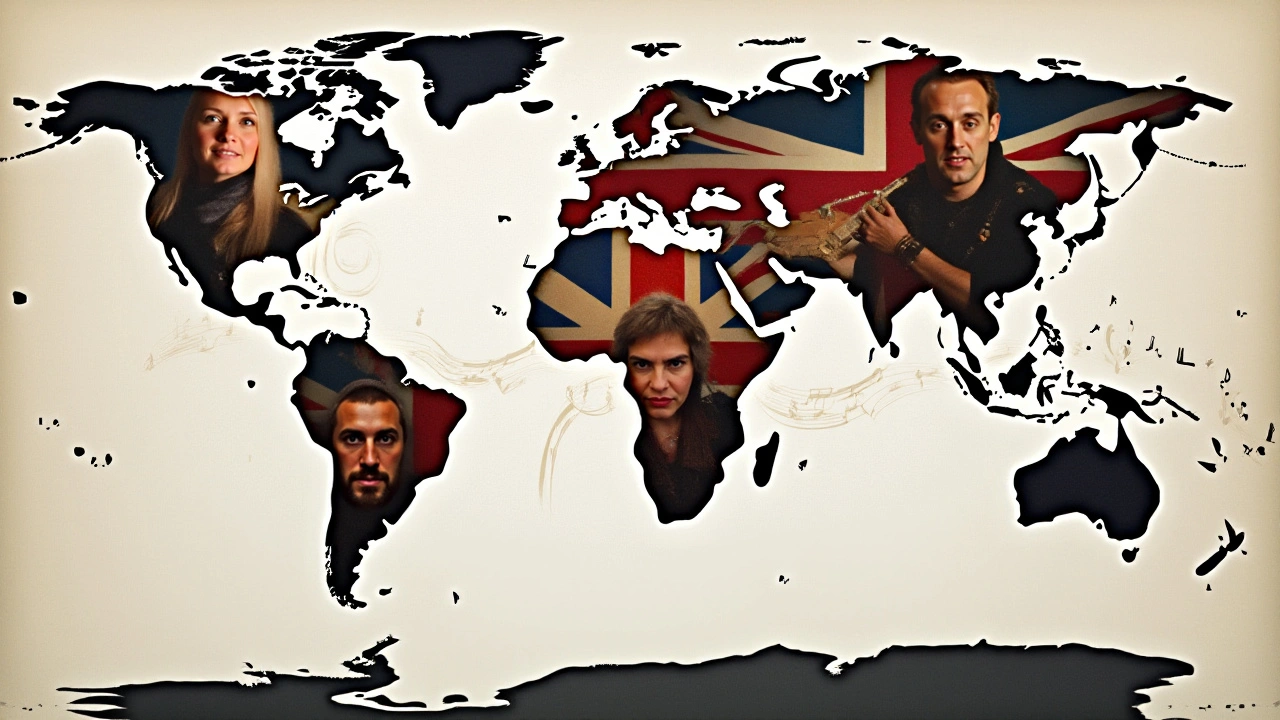Pop music often trickles into our lives in the background of cafés, car rides, and personal headphones. However, it's much more than a catchy beat or a chorus that lingers in your mind. This musical genre has woven itself into the fabric of our culture, reflecting the zeitgeist of each era with an unparalleled reach across continents.
While critics might dismiss its mainstream appeal, pop music’s significance is deeply embedded in how it mirrors social changes, geopolitical shifts, and the evolving landscape of human emotions. It's a language that transcends barriers, bringing together diverse audiences and offering a sense of belonging and identity. Delving into its layers, we find the essence of what makes pop music a truly transformative force in society.
- The Evolution of Pop Music
- Pop Music's Global Influence
- Shaping Societal Norms
- Pop Music and Identity
- The Future of Pop Music
The Evolution of Pop Music
Pop music has undergone a remarkable transformation since its early roots in the mid-20th century. Often recognized for its catchy melodies and widespread appeal, it began as a hybrid style blending elements of rock and roll, traditional pop standards, and even bits of jazz and soul. The 1950s marked an era where pop music started its climb into mainstream consciousness, with figures like Elvis Presley and Buddy Holly at the forefront, shaping a unique sound that captured the youthful rebelliousness and optimism post-World War II. This was a time when society was ripe for change, and music served as a vehicle to express and catalyze that change.
As the decades rolled into the 1960s and 70s, pop music continued to evolve, influenced heavily by the cultural upheavals of the time. The British Invasion, led by bands such as The Beatles and The Rolling Stones, brought a new flavor to the genre, infusing it with innovative lyricism and complex musical structures. This era also saw the rise of Motown, which seamlessly integrated pop with soul and R&B, creating a dynamic fusion that resonated with diverse audiences. The powerful voices of artists like Diana Ross and Stevie Wonder proved that pop music could be both commercially successful and artistically profound. The genre's adaptability became its greatest strength, allowing it to morph continuously in tune with global shifts in tastes and social consciousness.
By the 1980s, pop music had become a global phenomenon thanks, in part, to the advent of music television and the iconic image of stars like Michael Jackson and Madonna. Their music videos, which were both artistic and boundary-pushing, revolutionized how music was consumed and marketed, turning pop into a visual as well as an auditory experience. This decade also saw an unprecedented blending of technological advancements with music, as synthesizers and electronic beats took center stage, defining the sound of an entire generation. The accessibility of these new technologies democratized music production, paving the way for varied sub-genres and innovations within pop music.
The 1990s and early 2000s brought a digital revolution that further transformed pop music's landscape. As the Internet gained prominence, it revolutionized how music was distributed and consumed, giving rise to global pop icons who could reach audiences directly through platforms like YouTube and later, streaming services. Bands such as Backstreet Boys and musicians like Britney Spears captured this moment by appealing to teen audiences worldwide, fueling the phenomenon of 'teen pop.' This period also saw the rise of pop's intersection with other genres, leading to collaborations that fused pop with hip-hop, rock, and more, creating a dynamic soundscape that was more inclusive and diverse than ever before.
Today, modern pop continues to chart its course as a genre without borders. Artists like BTS and Billie Eilish showcase how pop can cross national and linguistic barriers, resonating with audiences through relatable themes and innovative production techniques. As the world becomes increasingly interconnected, pop music’s ability to adapt and reflect a myriad of cultural influences ensures that it remains at the heartbeat of global music culture.
Musicologist Simon Frith once noted, “What we think of as pop music at any point in time is usually a jamboree of styles and sounds.”This encapsulates the genre's enduring appeal - its evolutionary march forward, effortlessly blending tradition with innovation, making it so much more than just a genre.
Pop Music's Global Influence
The realm of pop music is an expansive one that bridges cultures and languages, creating a universal dialogue accessible to anyone with an ear for rhythm and melody. From the bustling streets of Tokyo to the serene beaches of Rio de Janeiro, pop music's infectious tunes have found their way into every corner, capturing the hearts of millions worldwide. This global reach is perhaps most evident in the way certain pop songs climb international charts, transcending linguistic borders. The melody often speaks louder than words, allowing listeners to connect with sentiments and emotions shared through the music itself. As pop music evolves, it often absorbs local influences, leading to an exciting fusion of sounds that celebrate cultural diversity.
This phenomenon isn't new. For decades, artists like The Beatles, Michael Jackson, and more recently, artists like BTS and Taylor Swift, have proven that pop music is a shared global language. While the Fab Four's influence was partly due to the post-war desire for uplifting entertainment, BTS's contemporary appeal can be attributed to the digital revolution, which allows for seamless sharing of music across international frontiers. As a result, pop music has become a flagbearer of globalization, where streaming platforms make it effortless for an artist from one continent to inspire and be inspired by sounds from another.
Pop music also reflects shifting cultural and political landscapes. In regions like Eastern Europe and Latin America, pop songs often come with an undercurrent of resistance and hope, highlighting issues like freedom and unity. This is not necessarily because the music is overtly political, but because it resonates with the everyday struggles and dreams of its listeners. Social media platforms amplify these messages, enabling influential pop tracks to become anthems in movements advocating for change. Such is the power of pop music—it not only entertains but can act as a catalyst for discussion and societal transformation.
In analysing specific trends, one can observe how pop music’s rising stars are redefining fame and cultural relevance. For instance, K-pop acts have taken over international stages, propelling artists into the Western spotlight like never before. This wave symbolizes the breaking down of musical barriers, where non-English tracks find massive audiences in traditionally English-speaking territories. Notably, the global K-pop phenomenon is complemented by sleek choreography and genre-blending music videos, illustrating how modern pop is as visual as it is auditory.
Interestingly, statistics reveal some of the underlying dynamics of pop music's influence. A 2022 survey by Spotify showed that listeners in 80% of countries streamed music outside their domestic market, indicating a strong curiosity for international pop. The same study revealed that 45% of listeners discovered new music through social algorithms, thus showing the inexpensive, viral nature of pop music today.
As pop music continues to spread and evolve, it remains an echo of societal shifts, echoing aspirations and fostering a shared sense of global identity. Through this genre, we witness not just an international blending of sounds but the burgeoning interconnectedness of societies themselves.
"Pop music at its best can provide a unifying language—a kind of Esperanto of the heart," says acclaimed music critic Simon Reynolds.This vibrant genre does not merely survive in its popular appeal but thrives in its ability to connect and inspire across global boundaries.

Shaping Societal Norms
Pop music has long acted as a reflection of societal values and a catalyst for change, influencing personal tastes and collective consciousness alike. The ability of pop music to shape societal norms can be traced back to its dynamic nature, always in step with current events and cultural shifts. Its power lies in its accessibility, reaching wide demographics and fostering conversations about subjects often considered controversial or taboo. From the protest anthems of the 1960s to the empowerment ballads of today, pop music provides a platform for artists to address issues like social justice, gender equality, and mental health, influencing public discourse and attitudes.
If we look at the 1980s, for instance, artists like Madonna pushed boundaries with songs that challenged norms related to gender roles and sexual expression. Her music became an anthem for many who felt marginalized and sought representation in mainstream culture. Similarly, Michael Jackson's groundbreaking music videos, such as "Thriller," not only redefined the pop music genre but also broke racial barriers on platforms like MTV, altering the landscape of media representation. These artists did more than create entertainment; they engaged listeners in deeper dialogues about identity and societal norms.
Pop music has also played a significant role in normalizing and raising awareness about mental health, a topic that had previously been cloaked in stigma. Artists like Billie Eilish and Logic have openly discussed their struggles with mental health, providing fans with not only relatable experiences but also the assurance that it's okay to seek help. This ongoing dialogue has contributed to a broader cultural shift, where discussing mental health is increasingly normalized and encouraged.
"Pop music is like a snapshot of the societal pulse," says Lin-Manuel Miranda, renowned composer and playwright. "It's ever-evolving, capturing the spirit of the times in a way no other art form quite can."
The global reach of pop music has further amplified its impact, as it transcends language barriers and fosters international understanding. The Korean pop sensation BTS, for example, uses their music to address issues from self-love to societal pressures, resonating with a worldwide audience and promoting a message of unity and acceptance. Their influence highlights pop music's role in shaping not just national, but global norms and ideals.
A look at the charts can reveal a lot about what's important to society at any given time. Whether it's the upbeat anthems that provide solace during difficult times or the poignant ballads that echo movements for change, pop music continues to be an integral part of the cultural dialogue. It acts as both a mirror and a mold, reflecting current norms while simultaneously shaping future ones. This ability to influence and initiate change is a testament to the enduring power of pop music as more than just a genre.
Pop Music and Identity
Pop music has an uncanny ability to define and shape personal and communal identity. Whether it's a nostalgic tune from childhood or a chart-topping hit that defines a summer, these songs often become a soundtrack to our own life stories. The influence of pop music on identity formation is profound, as music is a key medium through which people explore personal aesthetics, cultural affiliations, and emotional landscapes. For instance, the rebellious spirit captured by pop icons like Madonna in the 1980s provided a blueprint for self-expression and autonomy, inspiring countless individuals to break free from societal norms.
Identity construction through music is not limited to the past; it continues today as people find themselves resonating with the messages of contemporary artists. Consider how artists like Billie Eilish or Lil Nas X challenge conventional norms by expressing identities that push beyond traditional boundaries. The diversity in modern pop music allows people to see parts of themselves reflected in songs, videos, and the personas of the musicians who create them, fostering a sense of belonging in ever-changing social landscapes.
"Pop music has always been about breaking borders – music reaching out to touch lives and make connections," says musicologist Dr. Sam Weller. "It influences our dreams and aspirations, as much as it mirrors society’s current state."This capacity to connect and resonate makes pop an influential tool in both personal and collective identity building, illustrating its significance beyond just entertainment.
The role of pop music in identity can also be seen through its impact on social movements. Music has historically been a voice for the marginalized and a rallying cry for change, with pop tracks often capturing the spirit of various civil rights movements. Songs like Michael Jackson's "Black or White" or Lady Gaga's "Born This Way" foreground issues of race and sexual identity, embedding them in the mainstream consciousness. As listeners engage with these songs, they often find validation and empowerment, making them crucial to personal and collective empowerment and identity formation.
Moreover, pop music serves as a historical archive, documenting societal evolution through its trends and themes. As the genre evolves, it reflects shifts in cultural values, from the vibrant optimism of the post-war era to the digital futurism of today's interconnected world. Younger generations often look to the music of past pop legends to gain insight into eras they didn't experience firsthand, finding threads to weave into their own identities. This intergenerational dialogue facilitated by pop music enriches our understanding of how identity is both a personal journey and a shared experience.
In an era where globalization brings diverse people closer together, pop music operates as a universal language that allows individuals to express themselves and form their identities creatively. The genre’s accessibility has only been amplified by modern technology, as streaming platforms provide a vast library of tracks at our fingertips, enabling listeners to curate their personal soundscapes. As people across the globe embrace pop music, it continuously shapes and reshapes identity, reflecting the ever-evolving human experience. Ultimately, pop music transcends borders, embodying the collective voice of humanity and the dynamic tapestry of our shared identity.

The Future of Pop Music
The landscape of pop music continues to evolve, guided by innovations in technology and shifts in cultural paradigms. As digital platforms become increasingly sophisticated, they offer artists unprecedented opportunities to reach global audiences. Gone are the days when radio airplay dictated a song's success; now, algorithms on streaming services spotlight tracks based on listener data.
Technology is reshaping how we consume music, with augmented reality (AR) and virtual reality (VR) becoming more prevalent in concerts and music videos. These technologies promise immersive experiences that could redefine fan interactions and artist performances. As artists experiment with holographic performances and interactive exhibitions, the boundary between performance art and musical delivery blurs further.
The rise of artificial intelligence (AI) in the music industry also suggests a transformative future. AI can analyze vast amounts of data to predict trends, assist in composing music, or even create tracks. This doesn't replace the human touch but rather augments it, allowing musicians to explore new creative landscapes. The blend of human artistry and machine learning could lead to groundbreaking forms of expression that challenge the traditional confines of the music genre.
"We shape our tools and thereafter our tools shape us," noted Marshall McLuhan, highlighting the dynamic interplay between technology and human creativity.
Emerging genres influenced by global music scenes continue to boost pop's cultural impact. K-pop has illustrated how a genre rooted in a specific locale can capture international interest, proving that music transcends language and cultural barriers. As collaborations between Western artists and musicians from diverse backgrounds grow, they enrich the genre with unique sounds and stories.
Social media platforms also play a crucial role in the dissemination and popularity of pop music. They provide artists with direct engagement channels with fans, creating an environment where music is not just consumed but lived and shared communally. Viral challenges, shared playlists, and fan-driven content further sweat the influence of pop culture, ensuring it adapts swiftly to changing tides.
Challenges and Opportunities
However, the future is not without its challenges. The sheer volume of music available today can overwhelm listeners, leading to fleeting attention spans. This poses a challenge for artists who strive to create memorable and lasting careers. Additionally, issues like digital piracy and rightful artist compensation continue to shape industry discussions. Yet, every challenge presents an opportunity. The demand for authenticity and relatability in music has never been more significant, prompting artists to embrace personal and genuine artistry.
Ultimately, the future of modern pop lies in its ability to remain adaptable and inclusive. As it absorbs elements from diverse cultural textures, pop music will continue to resonate with the human experience, reflecting the complexities and aspirations of societies worldwide. The journey ahead is both exciting and unpredictable, but what's certain is the enduring power of pop music to inspire, connect, and entertain.

